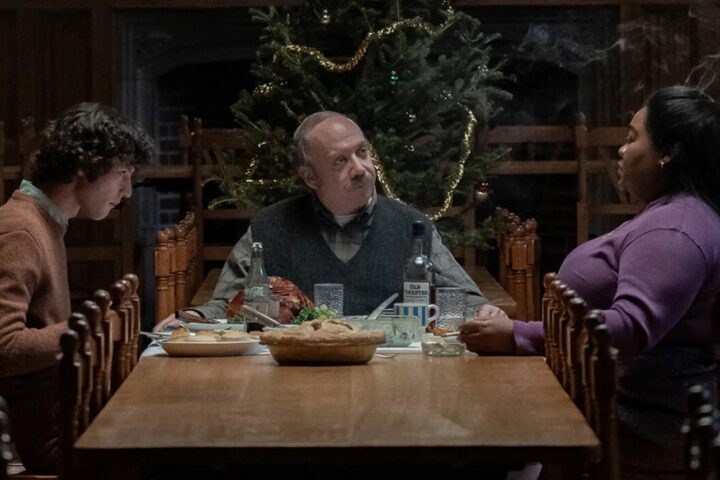With his 2009 musical romance Once, writer-director John Carney laid the groundwork for all of his subsequent films. He has, ever since, been telling stories about adrift musical folk eventually brought together by the intimacy of collaboration. His latest, Flora and Son, essentially doubles down on that commitment by focusing on two relationships built around music, but right away the film feels spread thin as a result.
The film’s central figure is Flora (Eve Hewson), a young single mother in Dublin who’s often out partying rather than caring for Max (Orén Kinlan), the now-teenage son she had before she turned 18. Their relationship is volatile, and their mutual disdain could hardly be more apparent. Flora makes no secret of the relief she feels when she can dump Max on the doorstep of her neck-tattooed ex-husband, Ian (Jack Reynor). Max, in turn, has taken to acting out, and he’s on the verge of being sent to a juvenile facility for all the times he’s been caught stealing.
Flora does remember to try to reach out to her son every so often, but when she gifts him a used guitar, he rebuffs her; after all, it’s a late present for his birthday, which she had forgotten. She then resolves to use the guitar herself and takes online lessons from Jeff (Joseph Gordon-Levitt), a soulful but resigned songwriter based in Los Angeles. In a sort of webcam-powered rerun of Once, Flora and Jeff slowly fall for one another, with their cross-continent chemistry demonstrated through the camera circling around Flora to make the laptop disappear and Jeff physically appear in the room. These lessons give Flora the power to reconnect with her son, who she’d have known was into electronic music and rap if she’d bothered to pay attention.
But whatever pain is meant to be at the heart of these stories meshes poorly with Flora and Son’s ultimately feel-good aspirations, as this is, after all, a film about the power of music to transform us. Flora’s often appalling parenting is presented as more of a quirk than a source of genuine strife. After she calls Max a “little prick” and throws a glass at the wall when he rejects the guitar, she comically fumbles to jam the instrument through a small window.
Flora and Son is far more invested in making its characters likable and cute rather than risking audience sympathies. We never even see Max steal anything until he’s established his need to impress a girl, and as a result he comes off more like a regular sullen kid than someone constantly at odds with the law. While many of these scenes are agreeable enough, it’s that very quality that feels so at odds with who the film keeps telling us its characters are.
In this regard, Flora and Son seems to inadvertently reflect its protagonist’s self-involved nature, short-changing Max’s storyline in favor of his mother’s flirtations with Jeff. It’s an imbalance that wouldn’t be so much of an issue if Flora’s characterization weren’t as flat as Carney’s depiction of her musical lessons with Jeff. For one, when Jeff asks Flora why she wants to learn guitar, she doesn’t have any more of an answer than the film does.
Flora’s motivations seem to change on a whim, alternately fueled by a need for attention, the desire for self-expression, and outright spite according to plot necessity. When she learns that Max is into a different style of music, the scene is less of a revelation due to her neglect than a hasty transition to both of them patching things up by collaborating on a song. Worse, the film can’t even lean on its soundtrack to carry these segments. Its corny attempts at rap are unfortunate, while the usual singer-songwriter material is generic and forgettable.
Flora is eventually forced to choose where to direct her full attention, but not even this brief sliver of intrigue is safe from Carney’s soft approach, as our main character’s crisis of conscience is quickly resolved just in time for a feel-good closing performance in a bar. Throughout Flora and Son, there’s a sense that its two plotlines might have worked in isolation, but when mashed together like this, they drown each other out like two singers out of sync.
Since 2001, we've brought you uncompromising, candid takes on the world of film, music, television, video games, theater, and more. Independently owned and operated publications like Slant have been hit hard in recent years, but we’re committed to keeping our content free and accessible—meaning no paywalls or fees.
If you like what we do, please consider subscribing to our Patreon or making a donation.





